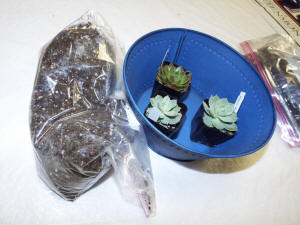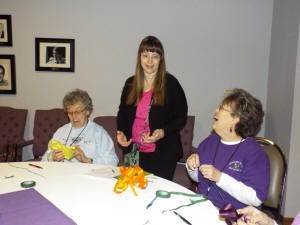|
 The morning at Lincoln College began with the
traditional registration hour and a time to visit with vendors
representing a variety of gardening clubs and organizations along
with those offering up information about honeybees and selling their
honey products, and a table set up to promote the upcoming Abraham
Lincoln Memorial Hospital Market that will being on Saturday, May
11th. The morning at Lincoln College began with the
traditional registration hour and a time to visit with vendors
representing a variety of gardening clubs and organizations along
with those offering up information about honeybees and selling their
honey products, and a table set up to promote the upcoming Abraham
Lincoln Memorial Hospital Market that will being on Saturday, May
11th.

Guests enjoyed sweets and coffee while visiting with the vendors and
waiting the first sessions at 9 a.m.
Succulents
The first discussion presented by Ellen Culver on succulents was by
far the most popular. With standing room only, Culver discussed
growing and caring for a wide variety of succulents including those
that are winter hardy for outdoor growing and those that are good
for indoor use.


In the second hour, Culver would lead a make-and-take project that
guests were permitted to plant their own trio of succulents in a
decorative pot to take home and grow indoors or outside this summer.
That planting was so desirable that some guests had to be turned
away because the room was completely booked.

Culver in her first session offered a slide show
presentation of the many varieties of succulents and spoke about her
favorites. She has an extensive succulent collection in her home and
also utilizes a few succulents in her work at the Sarah’s Garden on
the grounds of the David Davis Mansion in Bloomington.

Some of the best take away advise Culver offered in the first
session was on the care of the plants, which are lovers of dry warm
conditions.

In the home, succulents love warm rooms with low
humidity and direct sunlight. They like dry feet. Culver talked
about the drench, drain, dry method of caring for the plants. She
said the best practice is to fully drench the plant container with
water. Make sure the container has good drainage. When the container
drains, dump all the excess water, then let the plant alone until
the soils are once again dry. She said watering succulents should
not be done daily or even weekly. Culver said watering every two to
three weeks is best, and even then, check the soil for dryness
before proceeding. Succulents also require very little if any
fertilizer.

For outdoor growing in planters, Culver said again drainage is
important and it is good to have the planters set on ‘feet.’ This
can be something purchased such as a plant stand, put it can also be
done in a more affordable manner by just placing the pot on a raised
surface, so it is not directly on the ground and especially not on
brick or concrete that absorbs heat.
[to top of second column] |

Outdoors, direct sunlight can make some varieties
more colorful, but Culver also cautioned not to allow the plants to
be exposed to very hot sun.
She also offered a few troubleshooting tips. If the leaves are
shriveling – increase water. If roots are rotting – decrease water.
If the plant stems get leggy or are bending toward a light source,
then relocate them to increase direct sunlight.
Backyard beekeeping

In the first hour Steve Petrilli offered up
information on backyard beekeeping as the second of three sessions
during that hour. Petrilli talked about the history of the honey bee
and shared interesting facts such as the honey bee is the only
insect that is able to produce food for humans. Also, honey is the
only food that contains all the substances necessary to sustain
life.

Steve Petrilli talked about keeping hives in the garden, how to care
for the bees, and what is needed in order for the bees to produce
honey. Another interesting fact, to make one pound of honey the
worker bees in the colony must collect nectar from two million
flowers and will fly over 55,000 miles (accumulated over time).
Bee keeping in Illinois is growing in popularity. In 2013 there were
2,519 registered bee keepers in the state. In 2018 that number rose
to 4,308. The majority of these are small owners, with 89 percent of
the registered keepers having ten colonies or less. In Illinois
there are only 29 beekeepers with 100 or more colonies.
Floral Designs for the home
Bow making
The third discussion/workshop in the first hour of the day featured
Debbie Theobald of Debbie’s Downtown Floral in Lincoln. Theobald
spoke about floral arrangement and demonstrated how she puts
together the lovely arrangements that she sells in at her shop in
Lincoln. For those who may not be aware, Theobald took over the
space formerly known as Three Roses Floral in Lincoln after the
retirement longtime businessman Bill Bree.
Theobald maintains the same beautiful, classy store that Bree
started, and has a wide selection of items on hand for shoppers
every day of the week.


In addition to sharing some of her trade secrets with guests,
Theobald also taught a lesson on making bows for floral arrangements
and wreaths. The bow making activity was a very fun event that also
drove home to guests that what Theobald does on a daily basis takes
a lot of practice and patience.

At the end of the session each guest had made at least one to two
bows to take home with them, and one lucky participant won the
beautiful arrangement Theobald had made during the session.
In the second hour of the program there were again three breakout
sessions. Culver continued her presentation with succulents.
Gardening with culinary herbs
University of Illinois Extension educator Jennifer Fishburn spoke
about growing culinary herbs in the home garden. The herbs can be
used for cooking but she also highlighted herbs beneficial as
pollinators for local bees and other insects.
[Nila Smith] |